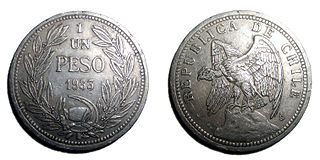This article needs additional citations for verification .(February 2023) |
| |||||
| Decades: | |||||
|---|---|---|---|---|---|
| See also: | |||||
The following lists events that happened during 1982 in Chile.
This article needs additional citations for verification .(February 2023) |
| |||||
| Decades: | |||||
|---|---|---|---|---|---|
| See also: | |||||
The following lists events that happened during 1982 in Chile.

The Chicago Boys were a group of Chilean economists prominent around the 1970s and 1980s, the majority of whom were educated at the Department of Economics of the University of Chicago under Milton Friedman and Arnold Harberger, or at its affiliate in the economics department at the Pontifical Catholic University of Chile. After they finished their studies and returned to Latin America, they adopted positions in numerous South American governments including the military dictatorship of Chile (1973–1990), as economic advisors. Many of them reached the highest positions within those governments. Ronald Reagan and Margaret Thatcher were influenced by Chile's policies and economic reforms.
The peso is the currency of Chile. The current peso has circulated since 1975, with a previous version circulating between 1817 and 1960. Its symbol is defined as a letter S with either one or two vertical bars superimposed prefixing the amount, $ or ; the single-bar symbol, available in most modern text systems, is almost always used. Both of these symbols are used by many currencies, most notably the United States dollar, and may be ambiguous without clarification, such as CLP$ or US$. The ISO 4217 code for the present peso is CLP. It was divided into 100 centavos until 31 May 1996, when the subdivision was formally eliminated. In July 2024, the exchange rate was around CLP940 to US$1.

The Viña del Mar International Song Festival is an annual international music festival held every third week of February in Viña del Mar, Chile. Started in 1960 it is the oldest and largest music festival in Latin America, and one of the longest running music festivals in the world. It was cancelled in 2021 and 2022 due to COVID.

Michael Kast Rist, commonly known as Miguel Kast, was a German economist of the Chicago Boys group. He served as Minister of State and President of the Central Bank under the dictatorship of Augusto Pinochet. In his youth, he was a member of the Christian Democratic Party.

Carlos Echazarreta Larraín was the 21st Mayor of the commune of Pichilemu, Chile between May 1947 and May 1950. He was succeeded by Sergio Morales Retamal. Echazarreta also was a regidor of Pichilemu for several terms.

Carlos José Ramón Echazarreta Iñiguez was the 27th and 30th Mayor of the commune of Pichilemu, office which he held between May 1963 and May 1967, and through the early months of the Augusto Pinochet military regime, between September and November 1973. In 1967 he was succeeded by Carlos Rojas Pavez, and in 1973 he was succeeded by Mario Urrutia Carrasco. Echazarreta also was a regidor of Pichilemu for several terms between 1959 and 1973.
Events in the year 1974 in Chile.
The following lists events that happened during 2008 in Chile.
The following lists events that happened during 1975 in Chile.
The following lists events that happened during 1976 in Chile.
The following lists events that happened during 1977 in Chile.
The following lists events that happened during 1978 in Chile.
The following lists events that happened during 1979 in Chile.
The following lists events that happened during 1980 in Chile.
The following lists events that happened during 1981 in Chile.
The following lists events that happened during 1983 in Chile.
Francisco Javier Cuadra Lizana is a Chilean lawyer, academic, and politician. He was a minister under the military dictatorship of General Augusto Pinochet, dean of the Faculty of Law, and later rector of Diego Portales University.

Banco de Talca was a Chilean bank founded in 1884, whose headquarters were in the city of Talca. Most of its operations were concentrated in the Maule and Metropolitan regions. In 1981 it was intervened by the Government and liquidated the following year, due to the debts contracted by the institution and of which its board of directors was accused of fraud.
The inflation in Chile has been a significant issue in the economy of Chile in the 20th century. In the 2020s it surfaced as an economic problem again during the second presidency of Sebastián Piñera and continues beyond it. This inflation has been attributed to a series of private pension fund withdrawals allowed by the Congress of Chile in response to the economic hardships of the COVID-19 pandemic in Chile. Besides this, food prices are held by the Food and Agriculture Organization to have increased as consequence of the 2022 Russian invasion of Ukraine.

The denialism of the military dictatorship in Chile is a type of negationist historical revisionism existing in Chile. It is a series of arguments and beliefs that seek to relativize, justify and even deny the crimes, human rights violations and antidemocratic actions committed during the military dictatorship (1973–1990).